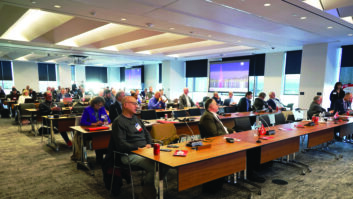The Emergent Employee
Oct 1, 2007 12:00 PM, By Erin Shipps
Estimated salary by job function.
Click to enlarge image

Estimated staff engineer salaries.
Click to enlarge image

Estimated salary for station managers, small markets.
Click to enlarge image

Training preferences.
Click to enlarge image

Method of program delivery.
Click to enlarge image

Median salaries by SBE certification.
Click to enlarge image

Level of SBE certification.
Click to enlarge image

Percent holding SBE certification. Click to enlarge image
Benefits received. Click to enlarge image
There is no doubt that radio has been changing in dramatic ways in the past few years. But these advancements in technology and radio’s overall capabilities haven’t just changed the way we listen to music � it has changed the way we transmit music � and a radio engineer’s job is more complex and developmental than ever. The good news is, you have been at this for a long time.
The great majority of radio engineers today have been in broadcast engineering for 20 years. That means you’ve seen the installation of more reliable equipment, you personally handle more stations (nearly four on average), and you’ve been forced into the role of IT guru, operating stations with computer technology that didn’t even exist 20 years ago.
This year’s Radio magazine salary report shows some interesting statistics about your ever-evolving careers. In general, 62 percent of respondents are in technical roles, 24 percent operational and 11 percent business. Small market salaries have increased by more than $8,700 from 2005 and two-thirds of contract engineers earn $50 or more per hour. The survey also found that, although some of you said you don’t need it, SBE certification increases salaries from nearly $44,000 to $57,000 below Top 50 markets and around $52,000 to $71,666 for Top 50 markets. The majority of you have attended an online seminar in the past five months and 59 percent prefer this type of training.
So take a look through some highlights of this year’s report. Want to know even more? You can purchase the entire report at www.buypenton.com/ProductDetail.asp?PRDID=4938.
Methodology
On May 15, 2007, Penton Media e-mailed invitations to participate in an online survey to a total of 4,092 subscribers of Radio magazine selected on an nth name basis from the categories radio stations and networks. To encourage prompt response and increase the response-rate overall, the following marketing research techniques were used: A drawing was held for one of four $50 Amazon.com gift certificates. A link was included on the invitation to route respondents directly to the questionnaire. The magazine name was used on the invitation to tie the study effort to the magazine. Follow-up e-mails to non-respondents were sent on May 30 and June 5, 2007 to this same group.
Write-in Answer:
What types of educational,instructional or tutorial topics would be most valuable to you?
When it comes to learning, few of you believe your education days are over. In fact, our survey shows you are mostly eager for any opportunity to do a better, more efficient job. With radio trends as they currently are, it is no surprise that the majority of you would like to learn more about HD Radio. And even though you have been wearing the hat of an IT professional for years, you believe you could use some help in the world of computers.
Another core group of engineers believe they could stand to learn something about emerging technologies and new media, including podcasting, streaming and satellite radio. You are also interested in topical instruction, such as RF, AM directional antennas, AES-3, audio over IP, automation and antennas. And you would like to learn a bit about management, legal aspects, basic engineering, efficiency and fund-raising.
Write-in Answer:
If you could change one thing�
There is an overwhelming majority on what you want out of your job: better pay and more technicians. After that there are a good group of you who are happy, followed by people who want better equipment/tools/company cars, a better budget, better management, an assistant, more free time/time to be creative, recognition, a change in a technical aspect, training opportunities and benefits, better communication, a change in programming, hours, regulations, personnel, less IT and more time in the field. There are a lot of things you would change to make your job easier, better, more fulfilling. Here are some of your responses:
�
- Better communication within the facility (e.g. management to ops staff, and interstaff)
- Another person to help with operations, IT and engineering.
- Better hours, replacing the required 24-hour on-call responsibility.
- Create a greater respect for engineering and engineers by top management. Change the business environment so that we plan and execute versus just reacting to the competitor.
- Get congress to legislate IBOC receivers if we are serious about making a transition to digital. Television has done it with ATSC; why not radio?
- I am quite satisfied really. At times the �always� on call idea can get old, but that is the trade off of being out in the field without management looking directly over your shoulder.
- Increase technical staffing, salary commensurate with experience and education
- The concept that pay is not tied to experience. I consider myself to be drastically undervalued for what I do. I do many things rather than specialize in one discipline.
- To have a full-time or at the very least a part-time assistant who could do coverage for me on the weekends, or for vacation, so it wouldn’t be such a hassle for me to get away. Currently I have to find another engineer to provide coverage for me.
- Since radio stations are getting close to being all computer-based we need to learn more about this area.












